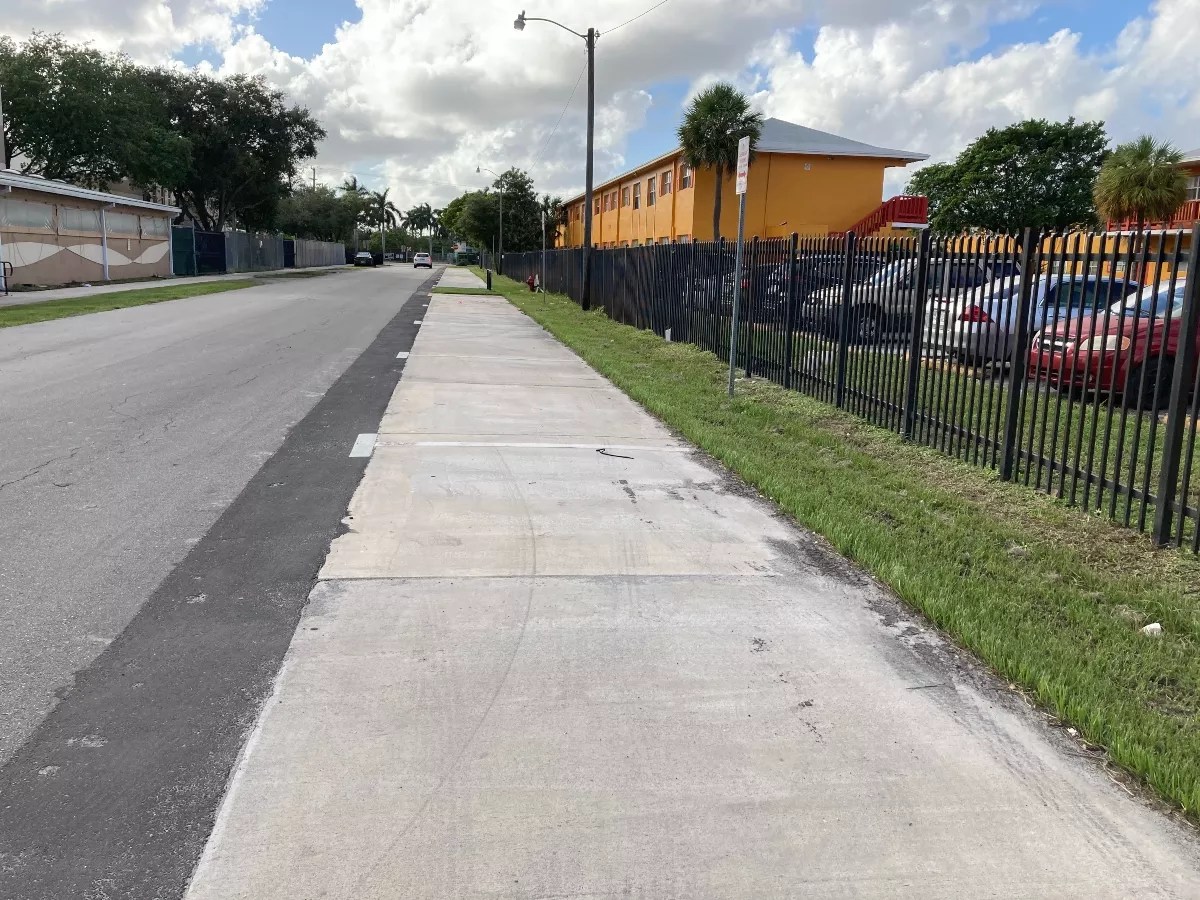
Photo by Jessica Lipscomb

Audio By Carbonatix
This past January, dozens of homeless people began setting up tents and sleeping bags behind the Salvation Army on Broward Boulevard in Fort Lauderdale. The camp created a stir – residents in the nearby Dorsey-Riverbend neighborhood complained about the tent city, and city leaders batted around an anti-camping ordinance.
But mere days before the measure failed by a slim margin on May 5, the camping issue seemed like a moot point: The people at the encampment had begun to vacate after receiving hotel vouchers from city officials, and a chain-link fence was erected in the area. The fence was plastered with signs warning that the area was now “a designated construction site” and that anyone who trespassed would be subject to a felony arrest.
The project created 17 parallel-parking spaces at 1400 NW First St., on a public swale behind the Salvation Army where the tent city had been.
But one homeless advocate says there was no need for parking in the area, and he believes the City of Fort Lauderdale paved the area with the sole purpose of displacing the homeless people who’d taken up residence there.
“It’s a nothing street,” says Jeff Weinberger, founder of the October 22nd Alliance to End Homelessness. “The only reason why cars ever go on the street is so they can turn into the Salvation Army parking lot. They didn’t need parking there.”
Although many of the camp’s residents were initially given hotel vouchers, Weinberger points out that funding for the vouchers expired this summer, leaving the recipients in yet another predicament about where to go.
“Giving people in the camp hotel vouchers, telling them, ‘We’re gonna protect you from COVID and put you on a path to housing’ – well, that’s a pretty nice carrot,” Weinberger says. “The reality was it was an inducement to leave the encampment so [the city] could move forward with turning the encampment into parking spaces.”
In September, Weinberger filed a detailed complaint with the Broward County Office of the Inspector General (OIG), alleging, among other things, that the construction project was “an unofficial but de facto campaign…to eliminate a legal encampment of homeless persons.”
The OIG closed the complaint on October 6, finding there was no need for an investigation.
“To sum up, what is wrong is not necessarily illegal or within the OIG’s jurisdiction or ability to inform the public to effect change in the public interest,” the close-out memo says.
Although the OIG declined to investigate, New Times was able to review some of Weinberger’s claims. A document Weinberger obtained through a public-records request says the parking project began May 17, a few weeks after the fence was erected. But Mike Jachles, a spokesperson for the City of Fort Lauderdale, tells New Times that plans for the parking area began in early 2020, “approximately spring” – which would have been well after the homeless population had moved in.
Jachles, who started working for the city this fall, says he does not know who initiated or spearheaded the parking project. But he says he was told there was a need for the parking and that the city worked with the Salvation Army to complete the project.
Maj. Stephen Long, area commander for the Salvation Army of Broward County, tells New Times that the need for parking was anticipatory, because the Salvation Army is considering plans to add on to its building.
“With an eye toward our future expansion, City of Fort Lauderdale officials approached us regarding converting their adjacent city-owned public parcel to a parking lot,” Long writes in an email. “The intent was to offer additional space to accommodate the Salvation Army of Broward County and surrounding area businesses.”
But in the meantime, there appears to be no such need for parking in the area – and given that the Salvation Army’s expansion plans are preliminary, it seems odd that in a time of economic austerity, the city would build out more than a dozen parking spaces for the possibility of a future need. Weinberger says the parking spaces have been empty when he’s driven past the area, and when New Times visited the site on a recent Saturday afternoon, not a single car was occupying the spaces.
Weinberger says the idea that parking was needed in the area is “bullshit.”
“All their arguments don’t hold water,” he says of the city, which is notorious for making the homeless feel unwelcome. “They act cruelly; they use trickery. They used hotel vouchers to get people out of there and then paved it over so that people couldn’t go back.”
Weinberger says he learned that his complaint to the OIG was closed only after being contacted by New Times. In an email on October 28, he urged the inspector general to reopen the case.
“Whether a construction project implemented by the city should serve a public interest, and whether the failure to do so violates such a public interest, is a question worth pursuing not just from a moral or practical basis but from a legal basis as well,” he wrote.